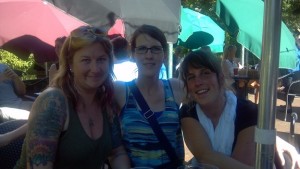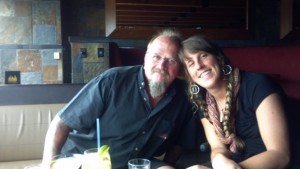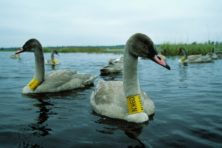A Natural Path
- Share
- Tweet
- Pin
- Share
In May, Facebook feeds fill up with graduation photos, pictures of mothers and fathers beaming with their children, a freshly minted diploma in their hand. One of the most impressive graduation ceremonies took place in June of 2014, when 31 year-old Egg Harbor native Natalie Boeck completed her long journey to graduate from the National College of Natural Medicine in Portland, Ore.
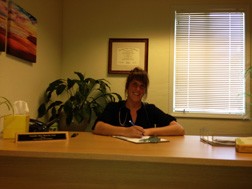
To understand the weight of her achievement, you have to go back 15 years.
Natalie was supposed to be at a cousin’s wedding in Milwaukee with her father and stepmother the weekend of July 29, 2000. Instead, the hard-working 16 year-old stayed home to fill her shifts at the Singing Bowl, the then-popular restaurant on the north end of Ephraim whose small staff didn’t leave a lot of room for weekend days off.
She stayed at her mother’s house in the woods in Egg Harbor, and was up and out the door by 9 am, the shimmer of the sun squinting through the trees on a bright, clear morning. Natalie walked to her gray 1981 Mazda 323 and hopped in.
It would be the last time she ever walked on her own.
About a mile from home, driving east on County Road E toward that bright morning sun, Boeck’s mind went blank. Maybe she was fiddling with the radio, or reaching for a CD. She can’t remember. But on that long, straight stretch of rural road interrupted only by occasional barns and the Birch Creek Music Performance Center, few cars ever travel slower than 55 mph, and a moment’s error can easily turn to catastrophe.
“My mind went blank,” Natalie recalled, “and when I snapped out I realized I was going into the ditch. I over-corrected and flew to the other side of the road.”
Her car flipped and Natalie, who wasn’t wearing her seatbelt, was catapulted from the car through the air and into a tree, stopped only when her back slammed into it.
Natalie’s mom, Linda Crocket, was cooking at the White Gull Inn when a friend came in the kitchen, waving her down. “Natalie was in an accident,” she told her. Crocket left immediately for the hospital in Sturgeon Bay. When Crocket arrived, the doctor was blunt.
“She has injured her spinal cord,” the doctor told her. “She’ll probably never walk again.”
Crocket called Natalie’s father and stepmother, Ron and Sheila Boeck, who had stopped for ice cream on their way home from the wedding in Milwaukee. Come quick, Crocket told them, they don’t know if Natalie will make it.
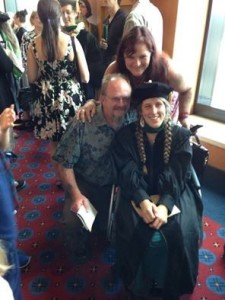
A terrible car accident didn’t stop Natalie Boeck from pursuing her dreams. In January, she celebrated graduation from the National College of Natural Medicine in Portland, Ore., with her father Ron (left).
Ron sped down I-43. His daughter was dying, and he was three hours away, helpless. Crocket called again. Natalie’s injuries were too severe to treat in Sturgeon Bay, so they were taking her to St. Vincent Hospital in Green Bay.
There, Ron received the same grim news Crocket heard earlier.
“If she can make it through the next three days,” doctors told Ron, “then she has a good chance of surviving. Walking, however, isn’t likely.”
Natalie doesn’t remember much of those days. She knew right away that she couldn’t walk, but she was on a tremendous amount of morphine, and the gravity of the situation didn’t sink in till later, when she was transferred to Froedert Hospital in Milwaukee, known for its rehab center.
“When I was transferred to Froedert, on the first day, they brought in this wheelchair and said, get up and hop in this wheelchair,” she recalled. “That’s when it set in that I wasn’t going to walk again.”
She spent two months at Froedert in rehab, learning to lift her legs off the bed in the morning, how to dress herself, how to get into her wheelchair by herself, and how to get back out. Her parents took turns driving to Milwaukee to be with her. Friends streamed in to see her. She had a lot of support, but Ron worried that his daughter would give up. He thought about what he might do in her situation, his life changed forever at 16. Then he tried not to. “I don’t think I’d have the mental strength to do what she did,” he said.
“We didn’t know what to think,” Sheila said. “How is she going to deal with it? How are we going to help her deal with it?”
Natalie’s classmates raised thousands of dollars to help pay for changes to her home to make it wheelchair friendly, and family friends helped Ron and Sheila turn the garage into Natalie’s new room. Ron, Sheila, and Linda steeled themselves for a lifetime of doing everything they could to care for their daughter. “We thought we’d be taking care of her for the rest of her life,” Sheila says.
Natalie had other plans.
During her treatment in the months after her accident, she noticed gaps in her healing, and in her treatment, that made her uneasy. She underwent multiple surgeries and was placed on a barrage of medications.
“Half of them were prescribed for side effects of other medications,” she said.
“She did not like being on those drugs,” Crocket recalled. “On top of knowing you’ll never walk again, you’re on these narcotics that make you crazy. She would apologize for acting that way.”
Natalie said she was always drawn toward natural therapies, influenced by her older sister Leslie, but her experience in the hospital crystallized her vision for what she wanted to do. She became more interested in what nutrients and diet could do to influence health and recovery, and by 18, she was more independent than Ron ever imagined, ready to move out on her own and pursue that path.
She moved to Waupaca with a friend and opened a bead shop, then applied for assistance from the Wisconsin Division of Vocational Rehabilitation [WDVR] to learn to drive again.
“The WDVR caters to motivated individuals with disabilities and help you meet career goals, no matter what that entails,” Natalie said. “They provided me with a vehicle and offered to cover tuition if I wanted to attend college.”
She did, and at 20, she enrolled at the University of Wisconsin – Stevens Point to study dietetics, a health field that focuses on the interaction between nutrition and health. After earning her degree in biology at Stevens Point she went to work with friends on an organic farm in Hawaii, an experience that furthered her belief in nutrition. Then she looked for a school to continue her studies to become a Doctor of Naturopathy. She eventually settled on National College of Natural Medicine in Portland, Oregon, where she could live near Leslie.
It wasn’t going to be easy. None of the schools she looked into had ever had a student in a wheelchair before. When she arrived in Portland, a teacher had placed a dummy on the floor and asked her, “How are you ever going to perform CPR?”
Natalie pulled herself out of her chair and onto the floor, and performed CPR on the dummy.
“How are you going to get back in your chair then?” the doctor asked.
“That’s not the point is it?” she responded.
The doctor had no further questions.
In January, Boeck became the first paraplegic in the country to earn a doctorate in naturopathic medicine and joined the Clinic of Natural Medicine in Eugene, Ore. Though confident in her abilities, she knew that patients might be thrown off when their doctor entered the room in a wheelchair.
“I was nervous about that, patients coming in and seeing their doctor in a wheelchair,” she said. “But I haven’t had any negative responses. I welcome the question, it’s the elephant in the room. People worry that there’s some sort of PTSD from it. But I’ve been in a wheelchair almost half my life, for as long as I was able to walk actually.”
The woman who hired her, Teresa Silliman, said Natalie’s paralysis didn’t worry her when bringing her on board.
“I wasn’t concerned about her paralysis because she had already gone through so much in medical school,” Silliman says. “She had performed there, so there was no question of whether she could do the job. Anyone, given the time and work ethic, can read and study and go to medical school. For me, the question is character and personality. Does she have listening skills? Is she a good person? You can be taught science and taught how to perform procedures, but you can’t be taught character, and her references were effusive about her character.”
When it comes to her patients, Boeck’s injury is a strength.
“To be a doctor, you have to have a strong presence,” Silliman said. “I don’t know all the details of her history, but I can assume she’s had to go through so much, and I can’t imagine a patient telling her that they can’t do something she suggests.”
•••
Every day, Ron Boeck drives down the stretch of County Road E where Natalie’s accident occurred. There’s no avoiding it. The tree is still there. Once, after the accident, Ron stopped to see it.
“It’s a small tree that she was thrown into, a birch tree maybe four to five inches,” he said. “I went out there to thank it. For stopping her from hitting one of the bigger trees.”
That tree is the only thing about the accident that has stopped her, and though there were mountains of obstacles between that day and her graduation, Natalie said there really wasn’t another path to take.
“I just felt like just because this happened to me this wasn’t a reason to stop living my life,” Natalie said. “I don’t feel like I even had a choice. I set out on a goal and just did it.”
•••••••••••••••••••••••••••••••••••••••
What is naturopathy?
The American Association of Naturopathic Physicians defines naturopathic medicine as a distinct primary health care profession, emphasizing prevention, treatment, and optimal health through the use of therapeutic methods and substances that encourage individuals’ inherent self-healing process. The practice of naturopathic medicine includes modern and traditional, scientific, and empirical methods.
Naturopaths are licensed as independent practitioners in 16 states, and can legally practice in several others. Applicants to accredited naturopathic medical colleges need a bachelor’s degree and a competitive GPA in scientific prerequisites, just like applicants to “conventional” medical schools.
A naturopathic medical license covers everything from dietary advice, to pharmaceuticals and suturing wounds, and in some states the license is near that of a nurse practitioner.
“We don’t learn surgery, but we do learn pharmaceuticals,” says Natalie Boeck, who received her Doctor of Naturopathy in January and practices at the Clinic of Natural Medicine in Portland, Ore. “We prescribe natural therapies as a first resort, while most doctors prescribe medication initially.”
Those natural therapies could include botanicals, nutrition, lifestyle changes, homeopathy, vitamins and mineral.
“A lot of the people that come to us have been to M.D.s and tried a lot of different medications, but feel that nothing helps them,” Boeck said. “They’re tired of taking medications and dealing with the side effects.”
Boeck said they often find that it’s an allergy to food that is causing a diseased state. Naturopaths pride themselves on the time they spend with patients. “We spend a lot of time with the patient, often an hour or more learning their history.”
However, naturopaths are not covered by Medicare or most insurance policies, and are often ridiculed by those in other fields of medicine. Boeck said that perception can be difficult to deal with, and she stresses that naturopaths are not averse to recommending that patients seek mainstream medical solutions.
“There’s certainly a time and place for modern medicine, I wouldn’t be alive if it wasn’t for surgery,” Boeck says. “But it’s not the only approach to every problem.”
Teresa Silliman, who hired Boeck at the Clinic of Natural Medicine, stressed that as well.
“You can’t go to an M.D. seeking advice that they won’t give,” Silliman said. “They’re trained to diagnose and medicate, and they do that really well and we really need them. But the nature of medicine today is that they don’t have the time to spend with patients. I’m sure they don’t like it, I’m sure they’d rather spend more time and do some of the things we do, but they don’t have that luxury anymore. We’ve taken away the art of their medicine, the art of observation and clinical experience.”

